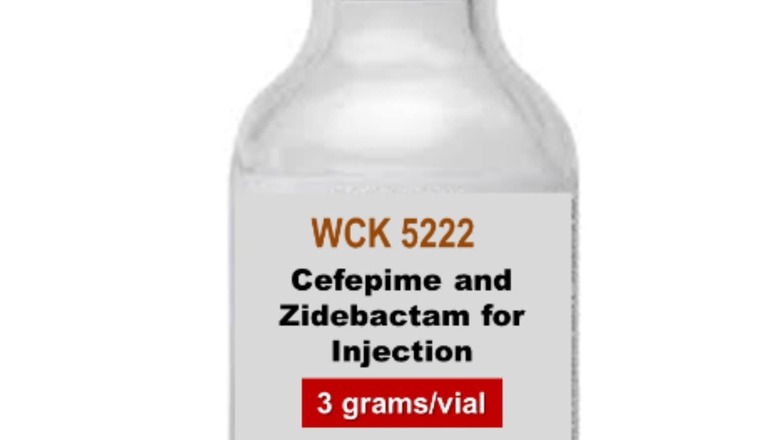
views
Over a million people lose their lives due to antibiotic resistant superbugs every year – far more than those killed by Malaria. By 2050, this number could go up to 10 million deaths annually. Now, an under-trial drug developed by Indian researchers has given hope in the fight against these deadly superbugs that threaten hospital patients.
Superbugs are bacteria, which become resistant to antibiotics, developed to destroy them. They are everywhere from hospital beds to ventilators, ready to attack patients with pneumonia, bloodstream or urinary tract infections, wound infections which can even be fatal.
The life-saving drug, WCK 5222, developed by one of India’s oldest drug makers — Mumbai-based Wockhardt — has now shown that it can act against the deadly multi-drug resistance (MDR/XDR) gram-negative bacteria or superbugs. After over a decade of research work, the Phase-3 trial of the drug is now underway in Europe with at least 70 people already enrolled.
Considering its efficacy and safety profile in Phase 1, the Drug Controller General of India (DCGI) even approved the under-trial drug for ‘compassionate-use’ last September. Since then, it has helped save lives of three patients suffering from life-threatening antibiotic resistant infections in Lucknow, Chennai and most recently Hyderabad.
SAVING LIVES ONE AT A TIME
“It can be a game-changer," says noted infectious disease specialist Dr Subramanian Swaminathan from Chennai’s Gleneagles Global Hospital who sought the drug ‘under compassionate use’ last October to treat a 12-year-old Thalassemia patient who developed critical Sepsis soon after his bone marrow transplant.
“Most other drugs are either too toxic, or difficult to use. But it has consistently shown good response, a heartening one. It helped us tide over a crisis by saving a life," he shares.
With the drug still under Phase-3 trials, the doctors also sought necessary approvals from the hospital’s ethics committee before approaching DCGI. The child has fully recovered following the drug therapy and was soon discharged.
Just a month before, WCK-5222 had helped save the life of another critically-ill patient — a 50 years old woman at Lucknow’s Medanta Hospital, who developed a postoperative infection which was later identified as XDR- Extremely-drug resistant infection. She remained admitted to the ICU for almost a month, yet the “bug" persisted and pneumonia worsened. According to doctors, the recovery began when she was put on 10 days’ drug therapy, and was soon discharged.
Dr Dilip Dubey, director of Critical Care Medicine at Lucknow’s Medanta Hospital who treated the patient, says there were “no adverse effects" of the drug. “There are very limited drugs against infections inside an ICU, and even fewer for India-specific drug resistant mechanisms, which are unique. Every hour of delay increases mortality risk. Fortunately, this drug has shown that it can fundamentally act against all three extreme drug resistant bacteria."
Last December, the drug was also permitted for ‘compassionate use’ at AIG Hyderabad to treat an 18 years old cancer patient who acquired a severe drug-resistant infection. According to the hospital, the patient was discharged following ‘complete clinical recovery’ after four weeks of drug therapy.
INVISIBLE PANDEMIC: RISE OF SUPERBUGS
With alarmingly few drugs in the pipeline globally, the rise of superbugs continues to worry the medical fraternity as it silently fights the infections inside the critical care units. Doctors who treat antibiotic-resistant infections say it is almost like “fighting a losing war" with no effective treatment options. The infections are deadly, and challenging to tackle. What’s worse is that the antibiotics currently available are either too toxic, or have poor efficacy.
New drugs are badly needed. But, the long, arduous scientific and regulatory processes and financial barriers have kept most pharmaceutical giants away from investing in new antibiotics, while the other firms, which are still pursuing it are struggling for funds and support. Amid all this, WCK-5222 has managed to cross the initial hurdles, and demonstrate activity against all the three extreme drug resistant superbugs.
“No other antibiotic in the market or in clinical development has shown such a broad-spectrum of activity against antibiotic-resistant bacteria. It can be a game-changer," concurs noted microbiologist Dr Balaji V from Christian Medical College, Vellore who independently evaluated the drug. “There is a greater confidence as majority of the research work has been validated by independent experts world over. So far so good."
LONG WAIT FOR AN EFFECTIVE DRUG
The research team at Wockhardt is confident the drug would clear the Phase-3 trial by next year. “Antibiotic resistance mechanisms prevalent in India are unique and most challenging, and almost all the drugs developed in the US or Europe fail to act against it. Therefore, the need for drugs which are India-centric. We have been receiving requests almost every week from hospitals for ‘compassionate use’," say Dr Sachin Bhagwat and Dr Mahesh Patel who are part of the drug-discovery research at Wockhardt.
At the current pace, the indigenously-discovered drug could take at least three years or even more, before it can hit the Indian market – a hotspot for drug-resistant infections. But an early availability ‘under emergency use’ could help save more lives, and the drug could be made available within six to eight months.
“The situation is very scary. Even though antibiotic resistance has surged to dangerous levels across all hospitals, it has become even more challenging to find molecules that can help in treating these deadly infections. It is important to exercise due-diligence in clinical development, but we hope that the drug is available to patients sooner because the threat of drug resistant infections has never been more immediate," says infectious disease expert Dr Subramanian Swaminathan.

















Comments
0 comment